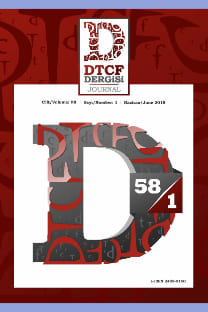IN THE EYE OF THE BEHOLDER: MATTIE SILVER IN EDITH WHARTON'S ETHAN FROME
This paper examines Edith Wharton's Ethan Frome as a work depicting the female confinement/entrapment in traditional roles, as well as of the limitations and expectations placed on women who are raised to become nothing more than domestic servants and companions for men in nineteenth-century American society, and also argues that young women, like Mattie Silver, are treated as beautiful objects for the male aesthetic appreciation and whether they are married or not they are expected to conform to the ideals of nineteenth century American womanhood. Set in the ctional New England town of Starkeld, Massachusetts, Ethan Frome tells the story of a taciturn farmer, Ethan Frome, whose dreams and desires end in a tragic way. Neither his wife Zeena Frome nor her distant cousin Mattie Silver is a center of interest in Ethan Frome as they are mostly excluded from the narration. Accordingly, an attractive young woman who has been recently orphaned, Mattie Silver is introduced as a weak, vulnerable person who is forced to move in to help Zeena with the household chores, and she is financially dependent on the Fromes for existence. This paper further argues that, Mattie's economic dependence has obvious narrative effects as she is not given an individual narrative section or point of view to articulate her own story; instead in the eyes of her admirer, she emerges vividly against the infertility, sickness and ugliness of the older Zeena. In other words, as Gilbert and Gubar (79) contend, Mattie is portrayed as an angel, a charming young woman full of joy and life with a sparkling personality in line with her name as if to justify Ethan's infatuation with her while Zeena is depicted as a monster, a witch or a madwoman.
BAKANIN GÖZÜNDE: EDITH WHARTON'IN “ETHAN FROME” İSİMLİ ROMANINDA MATTIE SILVER
Bu çalışma, Edith Wharton'un Ethan Frome isimli romanını on dokuzuncu yüzyıl Amerikan toplumunda kadınların geleneksel rollere sıkışıp kalmalarının yanı sıra erkeklere hizmet etmek üzere yetiştirildikleri ve yaşamlarını bir dizi kısıtlama ve beklentiler çerçevesinde geçirmek zorunda oluşlarının anlatıldığı bir eser olarak incelemektedir. Ayrıca bu romanın, Mattie Silver gibi genç kadınların erkeklerin estetik beğenisini karşılayan güzel objeler olarak değerlendirildiği ve ister evli ister bekâr olsunlar kadınların on dokuzuncu yüzyıl Amerikan kadınlık kriterlerine/kurallarına uymak zorunda oluşlarını yansıttığı düşünülmektedir. Massachusetts'te Starkeld isimli kurgusal bir New England kasabasında geçen Ethan Frome isimli kısa roman, hayalleri ve arzuları trajik bir şekilde sona eren ketum bir çiftçinin, Ethan Frome'un, hikâyesini anlatır. Romanda ne çiftçinin eşi Zeena Frome ne de eşinin uzak bir akrabası olan Mattie Silver ön plandadır ki zaten anlatıda çoğunlukla yer almazlar. Buna uygun olarak da, yakın zamanda anne ve babası vefat eden Mattie Silver, Zeena'ya ev işlerinde yardımcı olmak üzere Frome çiftliğine gelmek zorunda kalmış, hayatta kalmak için ekonomik olarak Frome'lara bağımlı zayıf, korunmasız bir kişi olarak tanıtılır. İlaveten, bu çalışma, kendi hikayesini aktarabileceği bir bakış açısına ya da ayrı bir bölüme sahip olmadığı için Mattie'nin ekonomik bağımlılığının romanın anlatısında gözle görünen etkileri olduğunu savunur: kendi hikayesini anlatmak yerine, hayranının gözünde adeta kendisinden çok daha yaşlı Zeena'nın kısırlığı, hastalıklı hali ve çirkinliğini ön plana çıkarırcasına vücut bulur. Diğer bir değişle, Gilbert ve Gubar'ın (79) kavramlaştırmasına uygun olarak, adı belirsiz erkek anlatıcı, Ethan'ın Mattie'ye olan yasak aşkını haklı çıkarmaya çalışırcasına Mattie'yi bir melek, neşe ve hayat dolu, Silver (Gümüş) soyadına uygun olarak göz alıcı bir kişilikte, genç bir kadın olarak tasvir ederken, Zeena'yı ise bir canavar, cadı ve hatta deli bir kadın olarak gösterir.
___
Ammons, Elizabeth. Edith Wharton’s Argument with America. Athens: U of Georgia P, 1980.
Bauer, Dale M. “Wharton’s ‘Others’: Addiction and Intimacy.” A Historical Guide to Edith Wharton. Ed. Carol J. Singley. NY: Oxford UP, 2003. 119-27.
Bernard, Kenneth. “Imagery and symbolism in Ethan Frome.” College English 23(3) (1961): 178–84.
Ferber, Michael. A Dictionary of Literary Symbols. Cambridge: Cambridge UP, 2007.
Fournier, Suzanne J. Edith Wharton’s Ethan Frome: A Reference Guide. Westport, CT: Praeger, 2006.
Gilbert, Sandra M. and Susan Gubar. The Madwoman in the Attic: The Woman Writer and the Nineteenth-Century Literary Imagination. New Haven: Yale University, 984.
Knights, Pamela. The Cambridge Introduction to Edith Wharton. Cambridge: Cambridge UP, 2009.
Pala Pull, Çiğdem. “Edith Wharton’s “Scheme of Construction” in Ethan Frome: A Statement about Writing.” Muğla University Graduate School of Social Science 6 (Fall, 2001): 1-7.
Pennell, Melissa Macfarland. “Frozen Lives: Edith Wharton’s Ethan Frome” (1911) Women in Literature: Reading Through the Lens of Gender. Ed. Jerilyn Fisher, Ellen S. Silber and David Sadker. Westport, CT: Greenwood, 2003.
Wagner, J. M., and and M. Demoor. “The Slippery Slope of Interpellation: Framing Hero and Victim in Edith Wharton’s Ethan Frome” Neophilologus 97.2 (April, 2013): 417-35.
Waid, Candace. Edith Wharton’s Letters from the Underworld: Fictions of Women and Writing. Chapel Hill U of North Caroline P, 1991.
Welter, Barbara. Dimity Convictions: The American Woman in the Nineteenth Century. Athens: Ohio U P, 1977.
Welter, Barbara. “The Cult of True Womanhood: 1820-1860,” American Quarterly 18.2 (1966): 151-74.
Wharton, Edith. Ethan Frome. 1911. With Introduction and Notes by Pamela Knights. London: Wordsworth Classics, 2004.
Wolff, Cynthia Griffin. A Feast of Words: The Triumph of Edith Wharton. New York: Oxford U P, 1977.
The Young Ladies Book: A Manual of Elegant Recreations, Exercises and Pursuits. London: Vizetelly, 1829.
